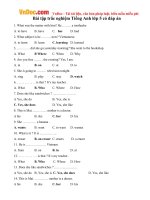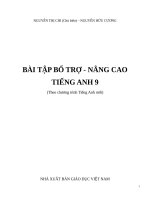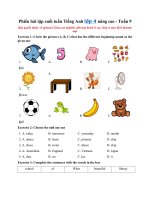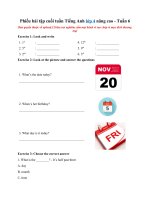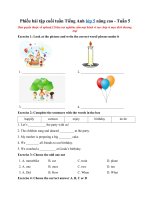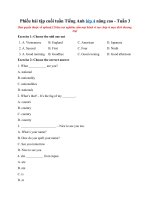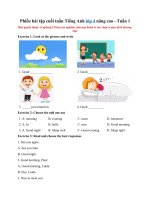- Trang chủ >>
- Mầm non - Tiểu học >>
- Lớp 5
345 BÀI TẬP NÂNG CAO TIẾNG ANH LỚP 5 CÓ ĐÁP ÁN
Bạn đang xem bản rút gọn của tài liệu. Xem và tải ngay bản đầy đủ của tài liệu tại đây (176.96 KB, 68 trang )
1
LESSON 1. REGULAR AND IRREGULAR PLURALS
EX 1. Circle the correct plural in brackets.
1.
Jim takes a (bus/ buses) to school every day.
2.
The fairy gave the girl (wish/ wishes).
3.
Many (persons/ people) take the subway every day.
4.
A lot of girls in my class have long (hair/ hairs).
5.
In France, there are many different kinds of (cheese/ cheeses).
6.
Some (man/ men) like playing football.
7.
We made a lot of (sandwich/ sandwiches) for the picnic.
8.
There are five different (fish/ fishes) in the aquarium.
9.
How many (child/ children) are there in your class?
10.
My baby sister has only got two (tooth/ teeth).
11.
Those three (women/ woman) are sisters.
12.
There are four (chairs/ chair) around the table.
13.
We get wool from (sheeps/ sheep).
14.
Cats like chasing (mouse/ mice).
15.
Put the (knifes/ knives) and forks on the table.
LESSON 2. COUNTABLE AND UNCOUNTABLE NOUNS
EX1. Look at the nouns in bold in the text. Circle the 5 countable nouns and underline
the 5 uncountable nouns.
Going to the beach
When you go to the beach you need to take a lot of things with you. You need a
swimsuit for swimming and a T-shirt to wear for playing on the beach. You should wear a pair
of sandals to walk on the hot sand. If the sun is strong, it’s a good idea to rub some suncream
on your skin and to wear a pair of sunglasses to protect your eyes. Don’t forget to take some
water to drink and some food to eat. Remember to clear all your rubbish and throw it into the
rubbish bin.
EX2. Choose the correct word in brackets to fill in the blanks.
2
Jo and her mother go shopping
“Let’s go shopping,” Jo’s mother said to her. Jo’s birthday was two days away, and they
needed to prepare for the grand party. “We need to buy a lot of (1) _____ (food/ foods). We
need fruit like some (2) _____ (kiwi/ kiwis), some (3) _____ (lemon/ lemons) and (4) _____
(a/ some) pineapple. We also need vegetables such as (5) _____ (onion/ onions) and (6) _____
(potato/ potatoes). To make a cake for your birthday, we need (7) _____ (some/ a) flour and
six (8) _____ (egg/ eggs). If you want a chocolate cake, then we should buy some cocoa
powder. Then, we must go to the butcher’s and buy (9) _____ (some/ a) meat for the chicken
burgers. On the way home, we can get (10) _____ (some/ a ) bread from the baker’s.”
LESSON 3. THE ARTICLES: A, AN, THE
EX 1. Circle the correct article in brackets.
1.
Take (a/ an) umbrella with you. It’s raining.
2.
Can I borrow (a/ an) pen, please?
3.
Sam rode on (a/ an) elephant in India.
4.
Can I play on (the/ an) computer now?
5.
The teacher is wearing (a/ an) orange dress today.
6.
Paris is (a/ the) capital of France.
7.
(A/ The) Amazon River is very long.
8.
We saw (the/ an) exciting film at the cinema.
9.
(The/ An) Internet has changed the way we live.
10.
This is (an/ a) easy exercise.
11.
I saw (a/ an) large snake at the zoo.
12.
Mount Everest is in (a/ the) Himalayas.
13.
Can I have (a/ an) apple, please?
14.
What is (the/ a) time?
15.
(The/ A) weather is very good today.
LESSON 4. QUANTIFIERS (2)
EX 1. Circle the correct quantifier in brackets.
3
1.
How (much/ many) pocket money do you get?
2.
I like (a little/ lots) of sugar in my tea.
3.
We just need (many/ a few) pencils for the project.
4.
How (little/ many) brothers and sisters do you have?
5.
Ann is very popular. She has (a lot of/ a few) friends.
6.
I don’t have (some/ much) homework tonight.
7.
Are there (many/ a) museums in your town?
8.
I have (some/ an) apples. Would you like one?
9.
Would you like more rice?
Thank you. Just (little/ a little), please.
10.
Your homework is excellent. You made very (a few/ few) mistakes.
11.
How (many/ much) time do we have?
12.
Not (many/ much) children live near my house.
13.
Could I have (a few/ a little) more orange juice, please?
14.
There are (a few/ a little) books missing.
15.
Martha likes to eat (lots/ lot) of candies.
EX 2. Circle the correct quantifier in brackets.
1.
I cannot watch TV tonight. I have (too many/ too much) homework.
2.
(Not much/ Not many) girls play football in my school. They prefer volleyball.
3.
Mr Lee could not find a seat on the train. There were (too many/ too much) people.
4.
Hurry up! There is (not many/ not much) time left.
5.
Sonia could not sleep. Her brother was making (too many/ too much) noise in his room.
6.
Harry is ill today. He ate (too many/ too much) chocolate yesterday.
7.
Jim could not finish the test. There were (too much/ too many) questions.
8.
Don’t take (too many/ too much) orange juice. Leave some for me!
9.
(Not many/ Not much) students come to school by car. Most people take the bus.
10.
It is (not much/ not many) fun to go to the beach on your own. I prefer to go with my
friends.
4
11.
There are (too much/ too many) chairs in this room.
12.
In the summer, there is (not many/ not much) rain.
13.
There is (not many/ not much) ice cream in the fridge.
14.
There were (too much/ too many) mistakes in my homework.
15.
(Not much/ Not many) names begin with the letter U.
LESSON 5. POSSESSIVE ADJECTIVES EX 1.
Circle the correct form of the possessive adjective in brackets.
1.
My sister is married. (Her/ His) husband is a teacher.
2.
London is famous for (its/ their) big red buses.
3.
Sam and I live on the same road. (His/ Our) houses are next to each other.
4.
Put (your/ you) seat belt on, please.
5.
My uncle loves football. (Their/ His) favourite team is Manchester United.
6.
Now everybody, please close (your/ my) books.
7.
Our neighbour has a cat. (Their/ Its) name is Blackie.
8.
Elena is from Spain. (Her/ Our) husband is from England.
9.
My best friend lives near my house. (Its/ His) name is Peter.
10.
We are friends. (Our/ His) hobbies are reading and gardening.
11.
I am from Singapore. (My/ Your) name us Maya.
12.
Helen has a brother and a sister. (Her/ His) brother is nine years old.
13.
David, please tidy this room. Put all (his/ your) things away.
14.
We won the match. (Your/ Our) team was the best.
15.
Linda and Stella speak French. (Her/ Their) parents are from Paris.
LESSON 6. ADJECTIVES OF QUALITY, QUANTITY, SIZE AND COLOUR
EX 1. Circle the correct adjective in brackets.
1.
Please use a (tall/ blue) pen to write down the answers.
2.
I live in a (large/ largely) flat.
3.
The teacher told the children a (funnily/ funny) story.
4.
This is a (use/ useful) exercise.
5.
I am (happy/ happiness) to see my friends.
5
6.
The new neighbour is very (friend/ friendly).
7.
This is a (good/ best) book.
8.
There is a very (highly/ high) tower in the city.
9.
The children had a (short/ shorts) break.
10.
The planet Mars is (red/ redder).
11.
The (badly/ bad) dog barked all night.
12.
I watched a (longing/ long) film on TV last night.
13.
My brother is (tall/ taller) and slim.
14.
The students are very (noisy/ noise) this morning.
15.
Mr Adams was (crossing/ cross) because James was late.
LESSON 7. SUBJECT AND OBJECT PRONOUNS
EX 1. Circle the correct subject pronoun in brackets.
1.
The bank is over there. (It/ They) is next to the post office.
2.
My name is Julia and (she/ I) am six years old.
3.
When the children finished their homework, (he/ they) watched TV.
4.
“Well done children,” the teacher said. “(You/ She) have all worked very hard.”
5.
In my family, (we/ they) all have dark hair.
6.
My brother is very lazy and (he/ it) never helps out around the house.
7.
Lindsay is my best friend. (I/ We) sit next to each other in class,
8.
Adam! (I/ You) are late. Come in and sit down.
9.
My mother is a doctor. (He/ She) works in a hospital.
1.
When my dog is hungry, I feed (it/ them) biscuits.
2.
That girl is my friend. I’ve known (us/ her) for years.
3.
Take those books off the table and put (it/ them) on the shelf.
4.
We all worked hard and the teacher gave (us/ you) good marks.
5.
I would like to thank (you/ me) for the present.
6.
Mr Clark is our teacher. We all like (him/ it).
7.
My sister gave (her/ me) a card for my birthday.
6
8.
Mr Jones losts his keys but I found (him/ them) in the classroom.
9.
The door is open. Please close (her/ it).
LESSON 8. DEMONSTRATIVE PRONOUNS
EX 1. Circle the correct demonstrative pronoun in brackets,
1.
Could you pass me (this/ that) pen, please?
2.
(This/ These) sandwich is delicious.
3.
(This/ These) sentences are easy.
4.
Do you know (that/ those) boy in the yellow shirt?
5.
I’ve never met (that/ those) children before.
6.
Come and sit on (this/ that) chair next to me.
7.
Have you heard (this/ these) story before?
8.
Who do (this/ these) pencils belong to?
9.
(Those/ These) tall trees over there are the oldest in the park.
10.
I don’t like (these/ that) colour green.
11.
(These/ That) book is all about horses.
12.
(These/ This) chairs are taken. Please sit somewhere else.
13.
All (these/ those) books over there belong to the library.
14.
(These/ This) computer isn’t working. Can I use another one?
15.
I’ve finished (this/ those) exercise. Shall I do another one?
LESSON 9. POSSESSIVE PRONOUNS
EX 1. Choose the correct possessive pronoun and write its number in the brackets.
1.
2.
My sister gave me her old mobile phone. So now, it’s _____.
A.
mine
B.
hers
C.
his
D.
theirs
All of you, congratulations on your work! Especially you, John. _____ is the best.
A.
Theirs
7
3.
B.
Yours
C.
Hers
D.
Mine
Lucy lost her pen yesterday. Is this one _____?
A.
mine
B.
his
C.
hers
D.
theirs
4.
Does that red car belong to your
family? No, _____ is blue.
5.
6.
A.
hers
B.
yours
C.
ours
D.
theirs
I took the wrong book. I thought it was _____.
A.
hers
B.
mine
C.
yours
D.
his
Our flat has three bedrooms. Sally and John’s flat has only two. _____ is smaller.
A, Hers
7.
B.
His
C.
Mine
D.
Theirs
Bill and I got good marks in the test. _____ were better.
A.
Hers
B.
Their
C.
His
8
D.
8.
9.
10.
Yours
My sister and I go to the same school. This is my classroom and that is _____.
A.
his
B.
mine
C.
theirs
D.
hers
That bag is not _____. Give it back. It belongs to me!
A.
yours
B.
ours
C.
his
D.
mine
Gary’s bag is red. This blue one can’t be _____.
A.
hers
B.
mine
C.
ours
D.
his
EX 2. Choose the correct possessive pronoun in brackets to fill in the blanks.
Tidying the bedroom
Reese
: We have to tidy our bedroom. There are things all over the floor and on the bed.
This book has your name on it. It must be (1) _____ (mine/ yours).
Emily
: Yes, it is (2) _____ (mine/ yours). Are these CDs from the library?
Reese
: No, they are (3) _____ (ours/ hers). Whose DVD is this?
Emily
: Susan lent it to me. It is (4) _____ (hers/ theirs).
Reese
: Tony and Lee left these games in here. I’m sure they are (5) _____ (his/ theirs).
Emily
: Yes, and this is a boy’s jumper. It must belong to Tony.
Reese
: Yes, it is (6) _____ (his/ hers). And do all these pictures belong to you?
Emily
: No, they are not (7) _____ (mine/ yours). I thought they were (8) _____ (mine/
yours).
9
Reese
: No, they are not. Oh look, Susan’s name is on them. They are (9) _____ (his/ hers)
then.
Emily
: I never realised there were so many things in our room that belong to Tony, Susan
and Lee. All of those things are (10) _____ (ours/ theirs).
LESSON 10. INDEFINITE PRONOUNS
EX 1. Circle the correct indefinite pronoun in brackets.
1.
Sally did not eat (anything/ something) for breakfast.
2.
Ron had a terrible day. (Nothing/ Everything) went wrong.
3.
Listen to me (no one/ everyone)!
4.
(Someone/ Anyone) forgot to turn off the computer.
5.
I’m bored. I have (nothing/ something) to do.
6.
Lucy has (everything/ something) to tell us.
7.
Harry could not find his maths book (nowhere/ anywhere).
8.
Can (no one/ anyone) lend me a pencil, please?
9.
(somebody/ Nobody) failed the test. We all passed.
10.
Not (somebody/ everybody) has a mobile phone.
11.
Dan couldn’t find his phone (nowhere/ anywhere).
12.
He looked (everywhere/ anywhere) for his keys.
13.
The teacher asked us a question but (no one/ anyone) knew the answer.
14.
I’m very hungry. Have you got (nothing/ anything) to eat?
15.
(Nothing/ Something) woke me up last night but I don’t know what it was.
LESSON 11. THE VERB ‘BE’: AM, IS, ARE
EX 1. Circle the correct verb in brackets.
1.
My father (are/ is) in his office.
2.
I (are/ am) hungry.
3.
You (are/ am) late.
4.
An umbrella (is/ are) useful in the rain.
10
5.
We (am/ are) both seven years old.
6.
The elephant (is/ are) in the forest.
7.
He (isn’t/ aren’t) my brother.
8.
Computers (isn’t/ aren’t) cheap.
9.
Come in. You (isn’t/ aren’t) late.
10.
I (am/are) not in the red team.
11.
You (is/ are) not as tall as me.
12.
Liam (is/ are) good at Maths.
13.
Mr and Mrs Jones (is/ are) British.
14.
The library (are/ is) full of students.
15.
I (are/ am) sorry but I forgot to do my homework.
LESSON 12. THE SIMPLE PRESENT TENSE
EX 1. Circle the correct verb in brackets.
1.
I (live/ lives) in a small flat on the third floor.
2.
Workers (work/ works) in the factory.
3.
The sun (rise/ rises) in the east.
4.
Ducks (like/ likes) cold water.
5.
My cat (sleeps/ sleep) all day.
6.
My teacher (come/ comes) to school by car.
7.
You (need/ needs) a warm coat in water.
8.
We (buy/ buys) all our food at the market.
9.
They (doesn’t/ don’t) live near us.
10.
Jim (doesn’t/ don’t) have a mobile phone.
11.
We (doesn’t/ don’t) have any homework tonight.
12.
The children (doesn’t/ don’t) go to school on Saturday.
13.
Aida (doesn’t/ don’t) speak Chinese.
14.
You (doesn’t/ don’t) need a raincoat today.
11
15.
That ball (doesn’t/ don’t) belong to me.
LESSON 13. HELPING VERBS: DO, DOES, DID
EX 1. Circle the correct helping verb in brackets.
1.
What time (did/ do) you get up this morning?
2.
What (do/ does) monkeys eat?
3.
(Does/ Do) I write well?
4.
(Does/ Do) the sun shine every day?
5.
What (do/ does) we have for lunch today?
6.
Did all of you enjoy the day trip? Yes, we (do/ did).
7.
Do you walk to school? No, I (doesn’t/ don’t).
8.
Did Sally finish her homework? No, she (don’t/ didn’t).
9.
Do I look like my brother? No, you (don’t/ doesn’t).
10.
Do cats chase dogs? No, they (don’t/ doesn’t).
11.
When (do/ does) the teachers have their lunch?
12.
Why (did/ does) you laugh at me?
13.
Some birds (don’t/ doesn’t) fly.
14.
My sister (doesn’t/ don’t) like tea.
15.
Did Helen and Lily do this exercise? No, they (doesn’t/ didn’t).
LESSON 14. THE PRESENT CONTINOUS TENSE
EX 1. Choose the correct helping verb and write its number in the brackets.
1.
2.
The dog __________ sleeping in the sun.
A.
is
B.
are
C.
aren’t
D.
am
Be quite! We __________ doing our homework,
A.
is
B.
are
12
3.
4.
5.
6.
7.
8.
C.
isn’t
D.
am
You __________ wearing a lovely dress today, Maria!
A.
am
B.
are
C.
is
D.
isn’t
Can you help me? I __________ trying to do a jigsaw puzzle.
A.
is
B.
are
C.
isn’t
D.
am
Let’s go to the beach today. The sun __________ shining.
A.
aren’t
B.
am
C.
is
D.
are
It is a lovely day. It __________ raining.
A.
isn’t
B.
are
C.
am
D.
aren’t
Please, can I go home? I __________ feeling well.
A.
isn’t
B.
are not
C.
is
D.
am not
Those children __________ making a lot of noise.
13
9.
A.
is
B.
aren’t
C.
isn’t
D.
am
They __________ working. They are playing.
A.
isn’t
B.
aren’t
C.
am
D.
am not
10.
What is that strange
noise? Sam __________
singing!
A.
aren’t
B.
are
C.
is
D.
am
LESSON 15. THE SIMPLE PAST TENSE: REGULAR VERBS
EX 1. Choose the correct verb and write its number in the brackets.
1.
2.
3.
I _____ to school this morning.
A.
walked
B.
walk
C.
walks
D.
walking
My grandmother _____ after us last night.
A.
look
B.
looking
C.
looks
D.
looked
Ben found an injured dog and _____ it home.
14
4.
5.
6.
7.
8.
A.
carry
B.
carries
C.
carried
D.
carrying
The little girl _____ when she fell from the chair.
A.
cry
B.
cries
C.
cried
D.
crying
My sister _____ with Sally on the phone for hours last night.
A.
chatted
B.
chat
C.
chatting
D.
chats
We _____ our uncle in the US last year.
A.
visit
B.
visits
C.
visited
D.
visiting
Our new neighbours just _____ in yesterday.
A.
move
B.
moved
C.
moves
D.
moving
The thief _____ the woman’s bag and ran off.
A.
grab
B.
grabbed
C.
grabs
15
D.
9.
10.
grabbing
Why didn’t the dog _____ when the visitor called?
A.
bark
B.
barked
C.
barks
D.
barking
When did you _____ piano lessons?
A.
starts
B.
started
C.
starting
D.
start
LESSON 16. THE SIMPLE PAST TENSE: IRREGULAR VERBS
EX 1. Choose the correct verb and write its number in the brackets.
1.
2.
3.
4.
Alice’s parents _____ in Singapore.
A.
grew up
B.
grown up
C.
grow up
D.
grows up
We _____ our cat and dog running into the neighbour’s garden.
A.
sees
B.
see
D.
seeing
I _____ the washing-up yesterday. So, it’s your turn today.
A.
do
B.
did
C.
does
D.
done
Bob was hungry so he _____ a piece of cake.
16
5.
6.
7.
8.
9.
A.
ate
B.
eat
C.
eats
D.
eaten
Who _____ all the milk last night?
A.
drinks
B.
drink
C.
drank
D.
drunk
I _____ my name on the form and handed it back to the teacher.
A.
writing
B.
writes
C.
wrote
D.
write
The birds _____ a lot of noise this morning.
A.
make
B.
made
C.
making
D.
makes
Last night, I _____ for ten hours.
A.
slept
B.
sleep
C.
sleeps
D.
sleeping
Dad _____ me a bike for my birthday last year.
A.
buy
B.
bought
C.
buys
17
D.
10.
buying
I _____ my bag at school.
A.
leaves
B.
leave
C.
left
D.
leaving
LESSON 17. IMPERATIVES
EX 1. Circle the correct form of the verb for these sentences which give orders or
instructions.
1.
(Opening/ Open/ Opens) your books to page 3.
2.
Don’t (ran/ run/ running) in the corridor!
3.
Now, (listen/ listened/ listening) to me carefully.
4.
(Do/ Don’t/ Does) write anything yet.
5.
(Come/ Came/ Comes) here please, Vanessa.
6.
Kevin and Sam, don’t (talking/ talk/ talks) when I’m teaching.
7.
Nora, (do/ doesn’t/ don’t) start the next exercise yet.
8.
(Hurried/ Hurrying/ Hurry) up or we will miss the bus.
9.
Don’t (worry/ worrying/ worries). These’s lots of time.
10.
(Be/ Are/ Is) careful when you cross the road.
11.
Please (speaking/ speak/ spoke) more slowly.
12.
(Stop/ Stops/ Stopping) writing now!
13.
Please (puts/ put/ putting) your hand up to answer a question.
14.
(Looks/ Looking/ Look) at the picture on the board.
15.
(Go/ Going/ Goes) to bed now. It’s late.
LESSON18. MODALS: CAN, MAY
EX 1. These sentences use can to talk about ability and can and may to give and ask for
permission. Circle the correct answer.
18
1.
Paul can (run/ runs/ running) very fast.
2.
May I (leaving/ leaves/ leave) the room, please?
3.
Can you (does/ do/ doing) this exercise?
4.
It’s very dark. I can’t (see/ sees/ seeing) anything.
5.
I’m sorry, sir. You can’t (parks/ parked/ park) there.
6.
No, you (not many/ may not/ not can) have another ice cream.
7.
The dogs (can’t/ not may/ doesn’t) go upstairs.
8.
(May not/ Can/ Does) you speak Chinese?
9.
Some birds can’t (fly/ flying/ flew).
10.
Can Beth (rode/ riding/ ride) a bicycle?
11.
The children (not can/ not may/ cannot) watch TV now.
12.
May I (starts/ start/ starting) to eat?
13.
Can the dog (go/ went/ goes) into the garden?
14.
We (can’t/ don’t/ not can) turn the computer on.
15.
He’s only five but he can already (speak/ speaks/ speaking) two languages.
LESSON 19. PREPOSITIONS
EX 1. Choose the correct preposition of time and write its number in the brackets.
1.
2.
I was born _____ December.
A.
on
B.
in
C.
at
D.
umtil
My sister started school _____ 2006.
A.
on
B.
in
C.
at
D.
from
19
3.
4.
5.
6.
School finishes _____ 1.30pm.
A.
on
B.
in
C.
at
D.
from
Bye! See you _____ Monday.
A.
on
B.
in
C.
at
D.
from
We never go to the beach _____ the rainy season.
A.
on
B.
in
C.
at
D.
from
Christmas Day is _____ 25 December.
A.
by
B.
in
20
7.
8.
9.
10.
C.
at
D.
on
If you have finished your homework, you can watch TV _____ dinner.
A.
on
B.
in
C.
at
D.
before
The film is on _____ 7 o’clock to 9 o’clock tonight.
A.
in
B.
from
C.
at
D.
on
On Saturdays, I can stay up _____ 9.00 pm.
A.
until
B.
in
C.
at
D.
from
The Principal is in a meeting this morning. She will see you _____ lunch.
A.
on
B.
by
C.
after
D.
until
EX 2. Choose the correct preposition and write its number in the brackets.
1.
The plates are _____ the cupboard.
A.
at
B.
in
C.
towards
21
D.
2.
3.
4.
5.
for
The children are _____ the swimming pool.
A.
at
B.
over
C.
after
D.
on
The swimming pool is _____ the cinema.
A.
near
B.
in
C.
over
D.
towards
Don’t stand _____ the board. I can’t see it.
A.
in
B.
behind
C.
in front of
D.
on
The girl is running _____ the main road.
A.
towards
22
6.
7.
8.
9.
10.
B.
at
C.
under
D.
after
The athletes jump _____ the hurdles.
A.
at
B.
on
C.
over
D.
in
The cat ran _____ the big dog.
A.
in
B.
away for
C.
over
D.
on
Jason got _____ the truck and drove away.
A.
towards
B.
into
C.
before
D.
over
In the alphabet, the letter ‘m’ comes _____.
A.
at
B.
on
C.
in
D.
before
Take everything _____ your bag and look for your purse.
A.
into
B.
out of
C.
near
23
D.
in
LESSON 20. ADVERBS
EX 1. Choose the correct adverb and write its number in the brackets.
1.
2.
3.
4.
5.
Every morning the children work _____ in their classroom.
A.
quiet
B.
quietly
C.
quieten
D.
quietness
Sally _____ gets good marks.
A.
well
B.
badly
C.
often
D.
once
Footballers run _____ to score goals.
A.
quick
B.
quickness
C.
quicken
D.
quickly
My sister has _____ been to Malaysia.
A.
never
B.
well
C.
always
D.
badly
Mooly reads very _____ now.
A.
good
B.
best
C.
better
D.
well
24
6.
7.
8.
9.
10.
How _____ do you go to the beach?
A.
sometimes
B.
ever
C.
often
D.
always
_____ we have pizza for lunch.
A.
Well
B.
Sometimes
C.
Badly
D.
Quickly
My dog behaves _____ when he sees a cat.
A.
often
B.
sometimes
C.
badly
D.
bad
The sun shines _____ in the morning.
A.
bright
B.
brightly
C.
brightness
D.
brighten
_____ look carefully before you cross the road
A.
Always
B.
Often
C.
Well
D.
Badly
EX 2. Choose the correct adverb and write its number in the brackets.
1.
It’s a lovely day. Go and play _____.
A.
outside
25

